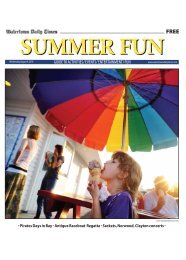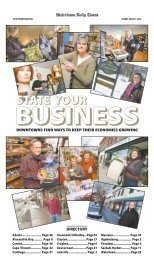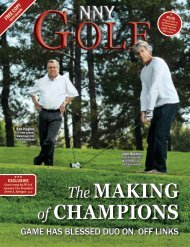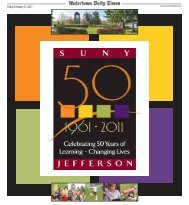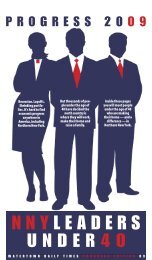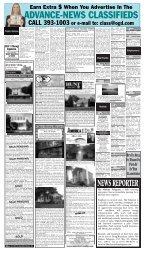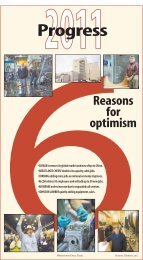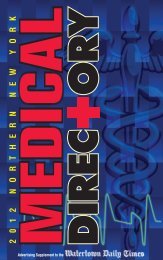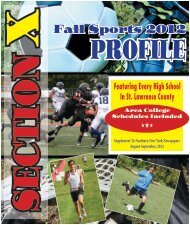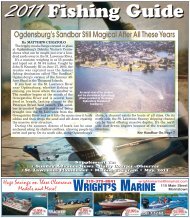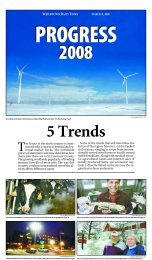C M Y KE12 <strong>Thursday</strong>, <strong>September</strong> <strong>22</strong>, <strong>2011</strong>WATERTOWN DAILY TIMESBy KEITH EPSTEINThe Huffington postMy first professional news jobwas in the Massena bureau in 1980-- I WAS the Massena bureau --and it was more than just a first job.It was boot camp, training groundfor all I’d encounter in journalismlater, and -- thanks largely to theJohnsons, the opportunities to diginto stories that mattered, and thenorth country I’d so soon be fondof -- a lasting inspiration.I was kept moving not only byambition or by news, but the relentlessdemands of a pre-Internetnewspaper devoted to missingnothing of significance for the45,000 people who depended onit. By day, between stories we hadto have, I’d diginto stories Iwas sure nobodyelse had-- yearning tomake the backpage, whichwas in thosedays equivalentto other Epsteinnewspapers’front pages. By night, I’d covermeetings and the occasional homicide.In the morning, a deadlineloomed - more stories, editing, updates.Today’s twenty-somethingbloggers think they’re part ofsomething thoroughly new. Butan afternoon newspaper in thosedays was like the Huffington Postin pace, quantity and importance-- and none of it could be aggregation.We had to beat the pants offThe Syracuse Post Standard and allthose pesky community weekliesscattered across the northern cornerof New York. And we had to doit, each of us, multiple times a day.I’d write three, five, six stories in atypical 16-hour day. Funny thingis, I wanted to. Ambition, opportunity,and the Johnsons made mewant to. My newlywed wife, missingme sometimes, would cometo the bureau at night, just to benearby, and fall asleep as I churnedout my copy or tried to track downa source or identify a victim.The <strong>Daily</strong> <strong>Times</strong> gave meRECOLLECTIONKeith Epstein: From WDT reporter to Washington, D.C. and beyondmore than my $126 weeklypaycheck. From the crampedbureau stacked with old newspapers,a room above a floristshop on Massena’s main streetthat often smelled of Easter liliesor other flowers of the seasons(most days, my biggest obstacleas a reporter was making myway through all the plants andwreaths in the hallway).I covered schools, courts,pollution, dairy subsidies, disastrousice and floods, cops-- and a few sordid crimes. I followedopenings, closings, lockcleanings and misdoings at theSt. Lawrence Seaway -- all fascinatingto a young kid from Californiawho’d studied politicalscience, but had never seen ironore ships or the bottom of a lockbefore.Long before pondering foreigncorrespondence or coveringwar, I got my first taste ofcovering armed conflict - duringa standoff between factions andState Police on the St. Regis Mohawkreservation. And my firsttaste (not counting the time thebird-loving elder Mrs. Johnsoncooked my goose for misidentifyingCanada geese as Canadiangeese) of reader anger.Once, after a big story theydidn’t consider fair, a group ofwomen took offense and surroundedme, armed with baseballbats. They must have likedthe stories that followed, becauseit never happened again.Between my other responsibilities,the paper more thantolerated my yearning to makea difference through investigativereporting, which I’ve spentmost of my career doing. Backthen, it was brucellosis andcattle smuggling across theborder, misspending by localschool districts, sexual harassmentby government officials,chemical contamination ofdrinking water -- and one ofmy first big breaks, disclosureof secret talks by local and stateofficials aimed at settling landclaims with the Mohawks.Of course, the north countryalso was the setting for oneof the biggest stories I’d evermissed: I’d met Abbie Hoffman,the ’60s fugitive radical,many times, without realizinghis true identity. My only solaceis that Sen. Daniel PatrickMoynihan, sipping a BloodyMary with us the morning beforea St Lawrence Universitycommencement address, alsohad no idea who the other manwith the curly hair really was.Still, reporters remember thestories that got away.Above all, the place and itspeople hugely influenced me.There was nothing like thenorth country before I arrived,and I’ve never experiencedanything like it. I’ll alwaysbe thankful for the people Imet - on dairy farms, RotaryClub lunches, on the reservation,in the zinc mines, on thecampaign trail with AlphonseD’Amato...but especially at thepaper and in its bureaus.Too many to mention, butI want to single out the Johnsons,who gave me my firstchance and believed in me, andAlan Emory, then the Washingtoncorrespondent and onetimeMassena correspondent,who took me under his wing inboth places, helping me get orientedto the land of Alcoa andthe small town borderlands,and to see the connection (orlack of connection) with ourleaders in Washington.My best memories of each ofthe Johnsons is telling. “JohnJunior,” with the enthusiasmof a man with ink in his veinsmore noticeably than a silverspoon in his mouth, was myfirst real editor -- sharp, funny,demanding, caring. A skeletoncrew would turn out the paperon Saturdays, often with Juniorat the helm, which meant histemporary position at a desknext to mine -- moving, alwaysmoving, excitedly askingquestions, assigning stories,wondering what we’d missed,always pushing to be first witha story, to envision the harderquestions we’d neglected toconsider. It should have beendreary hardship duty, thoseSaturday rotations, but theywere fun, fast-moving, satisfying,thanks to Junior.Then there was “John Senior.”Like the contemplative,spirited news people I’d meetlater, especially in Washington,he always had an opinion, andan eagerness to test it on you. Hecared about community, but Ican still see him, ensconced behindhis desk , puffing on a pipeas he’d ask me in and offered hisviews (and tested mine) on thebiggest issues of the day. Communityand nation and citizenalways seemed to connect inthat room -- another lessonfrom days at the WDT, and onethat has always stuck with me.We don’t just break stories andbeat the other guy -- we careabout them, and strive to showhow events, both unfolding orunnoticed and requiring disclosure,touch the lives of thepeople around us. Readers, citizensdepended on us, and wecouldn’t let them down.That’s something I learnedin Massena, Potsdam, Cantonand <strong>Watertown</strong>. But I’ve carriedit with me ever since, toVirginia, Florida and Washington,D.C., where too many reportersforget.
C M Y K• 1 50 th A N N I VE R SAR Y • 18 6 1 - 2 0 1 1 •WATERTOWN DAILY TIMES<strong>Thursday</strong>, <strong>September</strong> <strong>22</strong>, <strong>2011</strong> E13W A T E R T O W N1861 <strong>2011</strong>J OIN US FO R T H E N EXT 1 5 0 Y E A R SWD A I LY T I M E SBrothers and co-publishersJOHN B. JOHNSON JR. & HAROLD B. JOHNSON IIkeeping company on cusp of technological changesThere was no question about whowould guide the <strong>Watertown</strong> <strong>Daily</strong><strong>Times</strong> into the 21st century.Just as John B. Johnson had nurturedthe newspaper that his father,Harold, had built, the third generation, in thepersons of John Brayton Johnson Jr. and hisbrother, Harold Bowtell Johnson II, was beinggroomed to carry on the family business.“There was never an option,” said John Jr.,who is chairman and chief executive officer ofthe company. “That was a different day and age,the ’50s and ’60s. You did what you were told.”When their father died on May 2, 2001, the twobrothers stood as co-publishers.“As a kid growing up, it never entered mymind that I’d do anything else” except being inhis father’s communications business, said Harold,president and chief operating officer. “Therewere no overt discussions; I took it for granted.”But he thought his future was in the company’sbroadcast division at WWNY-TV, channel 7.Forced divestiture in 1981 switched channels forhim. The Federal Communications Commissionwon a court battle that required the newspaperto sell its television and radio holdings. The government’sfocus was to break up large monopoliesin the communications business.“They whittled down the number of targetedcompanies and settled on us because we were theleast powerful and the smallest on the block,” JohnJohnson said. His younger brother added, “It was avery bad move by the FCC. We had documentationshowing that the newspaper was very competitivewith the television station.”But good came out of the government action,Harold said. With the forced sale, the companyhad significant funds to reinvest. The outgrowthis the Johnson Newspaper Corporation, which,with its subsidiaries, Northern New York NewspaperCorporation, Batavia Newspapers Corporation,and Hudson-Catskill Newspapers, bringstogether seven daily papers, 12 weeklies, andthree advertising circulars.“The TV market was getting so fractured, wewere competing with cable TV,” Harold said.“We would have kept the station strong, but itwould have been difficult in competing. Withoutthe sale, we would not have expanded to otherpapers. I don’t know how we could have gotteninto that.”•••Stewardship of <strong>Watertown</strong>’s daily paper couldhave taken a different course. In 1950, the firstborn,7-year-old son of John and CatherineCommon Johnson was suddenly stricken withpolio.“I spent a lot of time at the Jefferson CountySanitorium, what is now Whispering Pines,”John Johnson said. “I was lucky. A lot of mendied there.“I remember very vividly rooms for four tosix boys. The halls were lined with guys in ironlungs, which were doing their breathing forthem. They were lying on their backs, with mirrorssuspended over them so they could seearound them. What an awful existence.”Only his mother was permitted to visit him.“I was paralyzed on the right side. It was veryhard for me to walk, and I was out of school thewhole winter. My mother exercised me andhelped tremendously in enabling me to regainuse of most of the leg.”Seven years later, that experience behind him,his grooming began, but not at the newspaperoffice on Arcade Street.“My summers of work in 1957 and 1958 wereat WWNY radio at the Hotel Woodruff, becausethe newspaper was deemed heavy industry.They couldn’t hire somebody who was less than16, but I could work at 14 at the radio.”The job for the future boss - messenger anderrand runner.After completing ninth grade at North JuniorSchool, his parents sent him to Phillips ExeterAcademy in New Hampshire to continue hiseducation. When at home, having reached ageThe trade magazine Editor & Publisher featuredthe WDT in an August 2001 cover story.John B. Johnson Jr.16, he was toiling as an office boy in his father’sheadquarters, “doing whatever Gordon Bryantwanted, running numerous errands” such ascarrying news copy to compositors and exercisinghis weak right side by running up and downtwo flights of stairs with newspaper morgue filesin hand.“It was hot. Being closed in by other buildings,there wasn’t any breeze. All the windowswere open, even in winter, because the buildingwas heated by coal, and it was very hot. And itwas creepy. Lots of stairways, narrow doorways,uneven floors. The press was under dad’s office,and when it ran, the vibration was felt and heardthroughout the building.”Outside, delivery trucks had a narrow drivewayin which to back to the rear of the building,Hence, the walls of buildings towering above thedriveway were well scarred.Eventually, he was allowed to do some writing— “local paragraphs, doing minor weatherstories, not significant weather events. I’d goto the post office about once a week to pick uppress releases at the various government offices.They seldom had anything to offer. If it was minorenough, they’d let me write it.”He consideredthe entirestaff his mentorsas he matured inthe company.“ E v e r y b o d yover the yearsmade a contribution,”he said.“It was an interestingatmosphereof peoplewho knew aboutthe city andcounty, whettingmy appetiteabout knowingwhat was goingon in the northcountry.”Harold B. Johnson IIHis fatherwas, of course,his primaryteacher.“He had a lot of influence over me. Newspaperjournalism was about the only thing we talkedabout. We all felt we were vicariously involved inthe business. The offices were our second home.There was a lot happening, and I learned a lotjust by being around. I learned who you couldcount on and who you couldn’t.”Graduating from Exeter in 1962, John Johnsonspent his next four years at Vanderbilt University,except for the summers he spent as a <strong>Times</strong>reporter, with one summer in the Massena bureau.Following Vanderbilt, he was off to ColumbiaUniversity for post graduate work. In 1968,he became a fixture in his father’s office, beingappointed general executive.After five years, in 1973, he was elevated tomanaging editor, As such, he delved full thrustinto every avenue of the business, grasping awell-rounded knowledge of the company.Harold, also educated at Exeter and Vanderbilt,got his introduction to the companyas mail boy and janitor at the TV side. Buthis introduction to the newspaper businesswasn’t ignored. Assigned to the circulationdepartment, his task was to burn some shoeleather, visiting homes in St. Lawrence Countyto sell subscriptions and the familiar blueboxes for rural delivery.As time passed at Channel 7, he began sellingadvertising, and got into writing and producingcommercials.With divestiture, he moved to the <strong>Times</strong> officeon Clinton Street, and in 1982 was appointedmanager of regional advertising, with a mandateto bring in more business from St. Lawrence andFranklin counties. As the company added properties,he was given a new responsibility in 1996.Named general manager of Johnson NewspaperCorp., his realm became coordination of allcompany holdings outside <strong>Watertown</strong>, as well asoverseer of advertising sales in <strong>Watertown</strong>.•••John Johnson Jr. reflects on how differentlythe transition in the newspaper’s managementwent for him, as compared to his father.“I was better prepared than was my father. Hisfather’s death was totally unexpected, a shock toeverybody, and dad had not been a participantin the day to day operations of the newspaper.<strong>Watertown</strong> <strong>Daily</strong> <strong>Times</strong> headlines from the last 39 years reflected the triumphs and tragedies ofAmerica’s history for north country readers.He was at a real disadvantage.”The movement that the company patriarch,Harold B. Johnson, had started toward developingradio and TV was successfully completed bythe second generation owner.“And then he had to turn around and sellthem,” John Jr. said, still showing bitternessabout the government’s suit.With the seating of the new Johnson regime,change was in the wind, not only for employees, butalso for subscriberswho wereaccustomed togetting home inthe afternoonfrom their dailyroutines to settledown in easychairs, withnewspaper inhand. On Sept.30, 2002, about16 months intothe new Johnsonadministration,the <strong>Daily</strong> <strong>Times</strong>became an exclusivelya morningpaper.It wasa move that JohnB. Johnson hadnot opposed, accordingto JohnJr.“He recognized that we had started as a morningpaper, but switched to the evening fairlysoon.”There were a number of factors forcing thecompany’s hand, he said.“We had less and less time to deliver thenewspaper each day, and we had a dwindlingnumber of potential carriers as youngmen and women were attracted to afterschoolactivities, not delivering newspapers.We knew the news cycle was against us. Wewere publishing way too much news thatwas 36 hours old before it was in the handsof readers. We had to tighten the scheduleby committing to publishing a complete accuratereport of the previous day’s activitiesthe next morning.”The afternoon paper was more fun for the editorialstaff because everyone was at the office atthe same time, he acknowledged, but “it was notgood for our readers. And to succeed the staff hasto accede to the needs of the customers.”Meanwhile, the Johnson family has continuedthe model established by the patriarch, standingas an advocate for the north country.“We stand for jobs,” John Jr. said in a 2001 interview.“What we’re interested in is increasedopportunity for the people who choose to livehere. We feel very strongly that we have to do as acommunity anything and everything to encourageinvestment and job creation.”The plight of the dairy farmer has long beena concern of the <strong>Times</strong>, and having available laborfor that industry “is very important to us,” hesaid more recently.The newspaper can be proud of “a lot of successes”relating to the development of the St.Lawrence watershed, he said.“A very important issue to us is maintainingthe steady generation of electricity from Massena,”he said. “We are a staunch defender of theNew York Power Authority, but we need a balancebetween the power authority and privateproviders like National Grid. We need to focuson having better transmission capacity for equalaccess ... not just when the wind blows and thesun shines.”With his reference to wind power, he raisedsome questions: Is it economically viable? Can itbe done without government subsidies?Editor John B. Johnson Jr. and Managing Editor Bob Gormanstand in the WDT newsroom for a photo that appeared in a 2006edition of the trade magazine Editor & Publisher.“With legislation that gives developers inordinatetax breaks, taxpayers are already subsidizingwind, so local people shouldn’t be given anadded burden.We don’t believe wind is a solution ... we needsolid electricity.”And the <strong>Times</strong> has been at the front on behalfof Fort Drum.“We are very concerned about utilization of allthe land at Fort Drum, for the defense of our nationand the training of soldiers,” John Johnsonsaid.Other concerns, he said, are accountability ingovernment and the mayor of <strong>Watertown</strong>, andissues in reapportionment.•••Like every newspaper and magazine acrossthe nation, the <strong>Watertown</strong> <strong>Daily</strong> <strong>Times</strong> has suffereda decrease in circulation, due to changinglifestyles and competition presented by theInternet. Similarly, the recession that struck in2009 seriously impacted the Johnson NewspaperCorporation.“Since 2009 has been a difficult time, with allthe challenges in the economy,” John Jr. said.“We have gotten through it without any layoffs,with pay cuts and furloughs. We reducedthrough attrition and retirements. Everybodyshared in the sacrifices equally. I don’t thinkabout it because I hate it.”Regarding the Internet, “We have coped withit well, as well as anybody has,” he said. “If wecan just figure out how to get paid for the workthat we do.”Through all the recent hard times, “the newspaperremains the dominant media here,” hesaid. “Not a week goes by that we don’t have astory that promotes discussion.”His brother added that Johnson NewspaperCorporation will continue to succeed whereother newspaper conglomerates may stillstruggle.“We broadened our base in community journalism— local newspapers still sell,” Haroldsaid. The large chains that minimized local newscoverage, “they are the ones who are hurting,”he said.Harold Johnson applauded the arrival of thenext Johnson generation into the business.“I’m pleased that mynephew, John BowtellJohnson, is back, andis willing to reinvest hislife.”The heir-apparent tothe company’s future,the 40-year-old JohnB. Johnson is generalmanager of NorthernNew York NewspapersCorp.He came back to <strong>Watertown</strong>after workingfor nine years at 3M inMinnesota.“I changed my lifebecause I believe inJohn B. Johnsonthe underlying fundamentals of the local news,sports and information business,” said John.“My role is to help the employees recognize theirstrengths and to embrace the changes that willbe required as we build sustainable businessesaround new platforms. As our platforms diversify,our shared goal is to be the most accurate,informative, timely and technological news servicein three county region. Success on differentplatforms means our staff teams will often needto re-conceptualize their jobs, especially as ouremphasis on local news, local sports and localviews continues to increase.”And another Johnson may be on the wayone day. Harold’s son, Alec, 25, is a reporterwith the Waterbury, Conn. Republican American.



